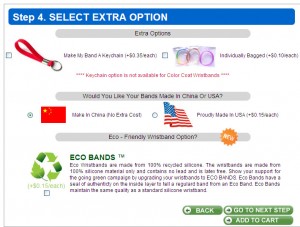 A friend of mine turned me on to the shopping experience at 24hourwristbands.com. They make all those silicone bands that say ‘Live Strong’ or ‘Support the Troops’ or ‘insert your cause here’. But its not that the wristbands themselves that got me excited.
A friend of mine turned me on to the shopping experience at 24hourwristbands.com. They make all those silicone bands that say ‘Live Strong’ or ‘Support the Troops’ or ‘insert your cause here’. But its not that the wristbands themselves that got me excited.
As you complete your order, you are asked if you would like the bands to be made in China, or made in America (for a $.15 upcharge per bracelet). That’s right. The user gets to choose.
I think this is brilliant. Giving users the option to buy american or not and showing them what the difference in cost will look like makes you stop and think about how much you value (or don’t value) where your products are made. And in most cases I would venture to guess that given the option, lots of people will shell out the extra fifteen cents to have it made here.
Moral of the story: Consumers are more concerned than ever where their products are made, and what they are made out of. Showing transparancy and providing information so that they can make informed decisions is a winning strategy. Quantifying what those choices mean for your own wallet and your community is even better.
So here’s my question to you – Would you pay a premium (or have you paid a premium) for goods that are made domestically? And would having the option make a difference in your purchasing decisions? Let me know.






